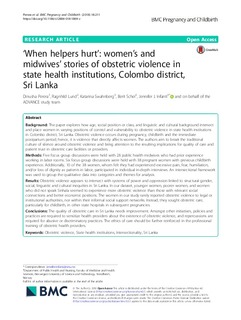| dc.description.abstract | Background
The paper explores how age, social position or class, and linguistic and cultural background intersect and place women in varying positions of control and vulnerability to obstetric violence in state health institutions in Colombo district, Sri Lanka. Obstetric violence occurs during pregnancy, childbirth and the immediate postpartum period; hence, it is violence that directly affects women. The authors aim to break the traditional culture of silence around obstetric violence and bring attention to the resulting implications for quality of care and patient trust in obstetric care facilities or providers.
Methods
Five focus group discussions were held with 28 public health midwives who had prior experience working in labor rooms. Six focus group discussions were held with 38 pregnant women with previous childbirth experience. Additionally, 10 of the 38 women, whom felt they had experienced excessive pain, fear, humiliation, and/or loss of dignity as patients in labor, participated in individual in-depth interviews. An intersectional framework was used to group the qualitative data into categories and themes for analysis.
Results
Obstetric violence appears to intersect with systems of power and oppression linked to structural gender, social, linguistic and cultural inequities in Sri Lanka. In our dataset, younger women, poorer women, and women who did not speak Sinhala seemed to experience more obstetric violence than those with relevant social connections and better economic positions. The women in our study rarely reported obstetric violence to legal or institutional authorities, nor within their informal social support networks. Instead, they sought obstetric care, particularly for childbirth, in other state hospitals in subsequent pregnancies.
Conclusions
The quality of obstetric care in Sri Lanka needs improvement. Amongst other initiatives, policies and practices are required to sensitize health providers about the existence of obstetric violence, and repercussions are required for abusive or discriminatory practices. The ethics of care should be further reinforced in the professional training of obstetric health providers. | nb_NO |

